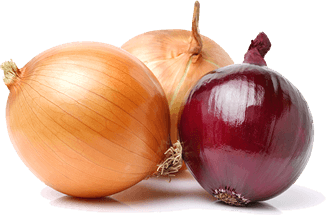Onions have been valued for their medicinal qualities by many cultures around the globe. Numerous health benefits have been attributed to the vegetable, including prevention of cancer and cardiovascular disorders. Scientific studies have shown a positive relationship between vegetable intake and risk for these common diseases. This has led many researchers to test whether the proposed medicinal attributes of onions are valid. Some of these studies have shown that including onion in the diet:
- Was associated with a reduced risk of stomach cancer in humans.
- Was associated with a decreased risk for brain cancer in humans.
- Inhibited platelet-mediated thrombosis (a process leading to heart attacks and strokes).
- Reduced levels of cholesterol, triglycerides, and thromboxanes (substances involved in the development of cardio-vascular disease) in the blood.
- Was associated with a reduction in symptoms associated with osteoporosis.
For a deeper understanding of these and other potentially beneficial qualities, scientists have studied specific compounds found in onion bulbs. Onions have a unique combination of three families of compounds that are believed to have salutary effects on human health – fructans, flavonoids and organosulfur compounds. Fructans are small carbohydrate molecules that help maintain gastrointestinal health by sustaining beneficial bacteria. A great deal of research has focused on one flavonoid, quercetin, which is found at particularly high levels in onions. It functions as an antioxidant, deactivating molecules that are injurious to cells in the body. Research studies have shown quercetin to:
- Decrease cancer tumor initiation.
- Promote healing of stomach ulcers.
- Inhibit the proliferation of cultured ovarian, breast, and colon cancer cells.
The organosulfur compounds are largely responsible for the taste and smell of onions. Research studies have shown organosulfur compounds to:
- Reduce symptoms associated with diabetes mellitus.
- Inhibit platelet aggregation (involved in thrombosis).
- Prevent inflammatory processes associated with asthma.
Many of these studies used non-human subjects. Others used experimental assays that mimic processes related to disease that occur in the body. More research is underway to assess the effects of dietary intake of onions on health in human subjects.
For additional detailed health research information please contact the National Onion Association at [email protected] or 970-353-5895.
About the National Onion Association
Founded in 1913, the National Onion Association (NOA) is the official organization to represent growers, shippers, brokers, and commercial representatives of the U.S. onion industry. NOA strives to preserve and improve the business environment of all participants in the industry, educate consumers about onion’s many uses and health benefits. For more, visit www.onions-usa.org.




